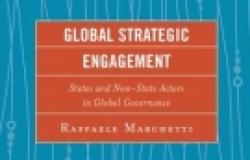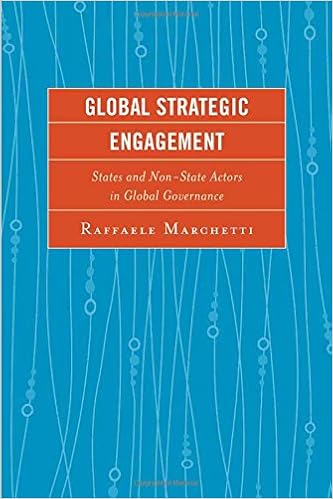Book Review - Global Strategic Engagement: States and Non-State Actors in Global Governance

Global Strategic Engagement: States and Non-State Actors in Global Governance by Raffaele Marchetti. London: Lexington Books, 2016. 210 pp, £52.95 hardcover 978-1-4985-1013-4, £29.95 paperback 978-1-4985-1015-8, £24.95 987-1-4985-1014-1
Globalization is a controversial phenomenon; power constellations are shifting and global politics involves actors and dynamics beyond state-based scenarios. According to Raffaele Marchetti, the world has moved toward a clear path of global integration since the end of the Cold War. Many authors studied the phenomena of the “Global Transformations” (Held et al. 1999), “Globalization” (Scholte 2000) and “The Emergence of Private Authority in Global Governance” (Hall and Biersteker 2002) with the end of the 1990s. However, since then, the path of global integration “under uncontested American leadership” (p. 161) has begun to be questioned. These developments make this recently published book an interesting read and innovative contribution to the debate on state and non-state actors in global governance.
The book is structured in four parts. The first part maps ways to understand and study globalization and its political dimensions. In addition to theoretical interpretations, it provides an excellent overview of indexes on globalization. Marchetti identifies seven main controversies that guide his observations and analyses. He reminds us that (1) the nature of globalization is contested, and (2) traces the controversies of the origin of globalization and (3) the motivations underpinning global market integration. The author also repeatedly addresses (4) whether it is still possible to pursue autonomous national policies in the age of globalization. Furthermore, Marchetti continually asks (5) who benefits from globalization, and who does not. This is ultimately linked to the controversy surrounding (6) globalization and justice. Finally, Marchetti emphasizes the controversy over (7) the political consequences of globalization.
The author includes critical perspectives and theories in this part of the book, while allowing himself a predominantly liberal and refreshingly optimistic understanding of globalization. Careful readers may already suspect his ambivalent attitude toward academic research, when he refers only to quantitative and economic methods to measure globalization, although he himself presents a book based on qualitative methods (in particular, a literature review). Marchetti is constantly concerned with adding a political perspective to the academic debate.
 The second part of the book outlines economic and socio-cultural dimensions of globalization. While other scholars have already shown how the Washington Consensus and Bretton Woods agreements gave birth to the present-day world economy in the 1990s, Marchetti presents the European Consensus and the Beijing Consensus as essential to understanding the more recent historic trajectory and the actors that have facilitated its consolidation. According to Marchetti, the European Consensus has added principles of poverty reduction, democratic values and accountability of developing countries for their own futures to the American version. By contrast, the Beijing Consensus, which decouples free markets from democracy and human rights, has been advanced as a sovereign alternative to the American version of globalization. Marchetti explains how divergent interpretations of globalization lead to different understandings of the state’s role and how this plays out in social life, including the recent rediscovery of the national and local dimensions of politics.
The second part of the book outlines economic and socio-cultural dimensions of globalization. While other scholars have already shown how the Washington Consensus and Bretton Woods agreements gave birth to the present-day world economy in the 1990s, Marchetti presents the European Consensus and the Beijing Consensus as essential to understanding the more recent historic trajectory and the actors that have facilitated its consolidation. According to Marchetti, the European Consensus has added principles of poverty reduction, democratic values and accountability of developing countries for their own futures to the American version. By contrast, the Beijing Consensus, which decouples free markets from democracy and human rights, has been advanced as a sovereign alternative to the American version of globalization. Marchetti explains how divergent interpretations of globalization lead to different understandings of the state’s role and how this plays out in social life, including the recent rediscovery of the national and local dimensions of politics.
The third part of the book focuses on post-Westphalian systems of global governance with a particular focus on new non-state actors, i.e. multinational corporations (MNCs), civil society organizations (CSOs), local authorities and standard-setting bodies. Marchetti describes five competing world systems that gradually emerged since World War II: (1) the state-centred United Nations system, (2) the two-block Cold War system, (3) a system guided by economic leadership of the G8, (4) a multi-polar world system in which BRICS countries play a greater role, and (5) an a-polar world system that acknowledges the power of non-state actors.
According to Marchetti, the fifth model has become reality. He describes the new types and roles of non-state actors in this a-polar world system. To him, in this system, MNCs are the most significant transnational actors in terms of actual ability to shape politics. However, they compete with CSOs to provide technical assistance to state governments, raise funds, formulate regulatory decisions, and implement programs and public policies. They further provide services, monitor international agreements, resolve disputes and enforce decisions. Increasingly, they are joined by sub-units of nation-states, in particular, regions and cities. Marchetti describes the resulting cleavages between globalism and localism, especially with regard to the diminishing significance of states with both trends.
Taking an actor-centred perspective, the book’s main interest tends to be giving strategic advice in terms of risks and opportunities to the diverse actor groups. It however pays tribute to (post-) structuralist and constructivist studies by presenting the four normative master frames of (1) Neo-liberalism, (2) Cosmopolitanism, (3) Localism and (4) Civilizationism. While Neo-liberals understand globalization to be based on economic market integration and Cosmopolitans highlight origins in political and civic aspects of life, both share a positive perception of globalization. By contrast, the two latter frames are anti-globalization: Localism recognizes local traditions and cultures as the social bond, and Civilizationism reflects Huntington’s thesis of a “clash of civilizations”. While Marchetti mentions the possibility of dialogue among cultures and religions, following Huntington, he clearly warns against the risks of increasing conflict and competition in the future.
In the last part of the book, Marchetti’s observations and analyses of globalization culminate with policy advice. He points to those who have so far not benefitted from globalization and warns that democracy will fail if not applied at the global level. The United Nations system, which assumes that the demoi is rooted in the national context, is contrasted with a functionalist model and a truly cosmopolitan model, both based on the assumption that there is a transnational demoi. For the world to come, Marchetti sketches five scenarios ranging from a liberal nature that considers globalization as an unstoppable movement, to the formation of differentiated areas of development.
Unlike earlier books on globalization and non-state actors, Marchetti comes back to a state-centred perspective at the end of the book. He concludes that, while the trends show that the United States has lost its hegemony and the EU is still suffering from economic crisis, BRICS countries, especially China, are gaining power. He raises the questions of whether the EU and China will be able to fill the void left by the old hegemon and what risk of a world conflict exists. This book provides “keys of interpretation” for everyone to consider these questions. In this sense, it is clearly making a statement in favour of globalization.
Mareike Blum is a PhD Candidate at the University of Freiburg. She holds a Bachelor's Degree in Governance and Public Policy from the University of Passau and a Master's Degree in Environmental Governance from the University of Freiburg. Her main research interests lie in the field of transnational sustainability governance. PD Dr. Lena Partzsch is Associate Professor (Privatdozentin) at the University of Freiburg. She holds a Diploma and PhD from the Freie Universitaet Berlin and received the venia legendi for political science from the University of Muenster. Her research interests lie in the fields of environmental politics and international relations.


